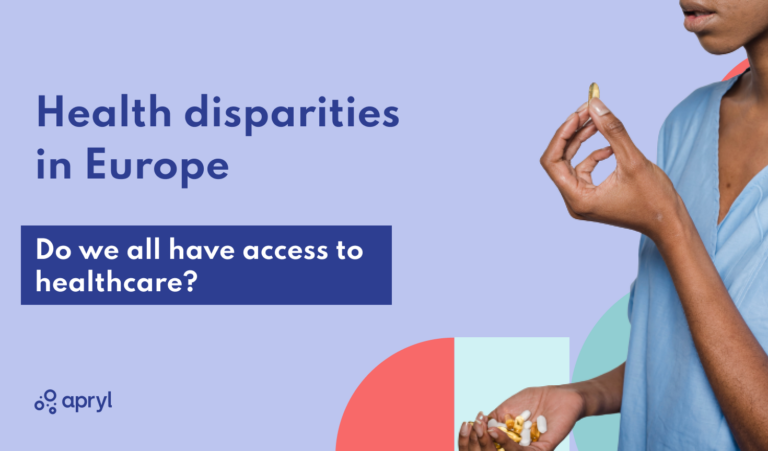The right of everyone to timely access affordable and preventive care of good quality is one of the key principles of many European countries. This means that access to healthcare should be effective for each person and provided when needed, and that costs should not be a barrier to receiving sufficient care.
However, people of colour and ethnic minority groups experience higher rates of illness across a wide range of health conditions. This constant pattern raises the question whether ethnicity and race may play a role as a fundamental cause of health disparities in Europe.
Health disparities in Europe, what are the facts?
The term “health disparities” is defined as a difference in which disadvantaged social groups such as the poor, racial/ethnic minorities and other groups who have experienced social disadvantage or discrimination, systematically have worse health or greater health risks than more advantaged social groups. This means that due to external factors, some of your employees are in worse health conditions than others. Let’s look at some facts:
- Ethnic minorities in all respective European countries experience longer waiting times than majority groups. Additionally, there has been a lack of transparency on priority setting on these waiting lists.
- Currently in the UK, more than twice as many south Asian women are diagnosed with anxiety and depression as white women (63.5% vs 28.5%), and psychotic disorders are more than ten times more prevalent among Afro-Caribbean men than white men (3.1% vs 0.2%). However, these minority groups are less likely to receive adequate care in appropriate mental health facilities.
- Black people have a higher risk experiencing cancer in the duration of their lives. But, they participate half as much in cancer screenings than their white counterparts in Europe.
Health disparities in fertility and maternal health
The infertility rate ranges from 6%-15% among people of reproductive age. Though, Black Women, and Women of Colour experience higher rates of infertility than White Women but are less likely to access treatment and may wait twice as long before getting appropriate care. To continue, new figures released by the Human Fertilisation & Embryology Authority (HFEA) suggest that Black Women have higher risks of experiencing pregnancy related deaths but receive less pregnancy counselling.
Causes of health disparities
Although it is fairly difficult to pinpoint exactly where these health disparities come from, there are a few causes that can be highlighted:
Systematic racism
Many healthcare providers took an oath to treat all patients equally and most healthcare providers are not explicitly racist and are fully committed to treating all patients equally. However, they operate in an inherently racist system dealing with subconscious prejudices we should not ignore.
Examples of these proven false beliefs include Black people having thicker skin, less sensitive nerve endings, or stronger immune systems. These prejudices are extremely dangerous because it obstructs Black people from getting suitable care.
Cultural practices
In some cases, cultural practices abstain ethnic minority groups from asking for help. For example, research shows that South Asian women in the UK are less likely to go to the doctor when the doctor is male. And, topics such as infertility and mental health are still highly stigmatised in the black community which makes it harder to address any issues involving these topics with their surroundings, and with caretakers.
Income level
Partly due to institutional discrimination in governments, corporations and education systems, minority groups experience lower income levels. Although there are many more layers to this topic, and even more negative consequences, we want to highlight two examples of how lower income levels affect the health of minority groups.
- Dental care is often excluded from benefit packages in many European countries, including Belgium, France, Germany, Luxembourg and the United Kingdom. Roughly two-thirds of total expenditure on dental care is paid from private sources which makes dental care less of a priority for ethnic minorities.
- Another example is maternity care. Even when maternity care is provided free of charge by European health institutions, still in many cases households pay a fair proportion of the cost of facility-based services such as pregnancy screening or birth preparation counselling.
Supporting the health of all your employees
There are a few things you can do to support the health of all your employees:
Talking about mental health and infertility
As we have seen, topics surrounding infertility and mental health are still highly stigmatised which prevents minorities from asking support from their employers throughout the process. Thus, creating an environment in which all your employees feel comfortable and welcome to share their problems, is already a step in the right direction. An example of how you can create this environment of trust can be done by having educational sessions around fertility and mental health.
Tackle your own biases
Research has shown that we all carry prejudices within ourselves. These prejudices can manifest themselves in discrimination and racism which does not necessarily has to look like racially degrading words, but more as not inviting someone for an interview because of their name. Because we have carried around these biases and prejudices for years, it can be difficult to get rid of them immediately.
The first step is acknowledgement, then you will have the ability to see examples of unambiguous bias and speak out against them which helps create and reinforce a standard for yourself and the people around you at work, in addition to providing some help to those who are the targets of explicit and implicit prejudice.
Provide the right benefits
We have seen that ethnic and racial minority groups have a lower income level and more issues conceiving. Providing the right employee benefits strategy can help with that. For example offering your insurance and incentives programs can improve their financial wellbeing. To continue, offering inclusive fertility benefits can help all your employees start their family forming journey with the equity they need.
Future outlook
Improving the health of all minority and ethnic groups will not happen overnight. Luckily, The Organisation for Economic Co-operation and Development (OECD) announced more research on health disparities in Europe. But, change needs to happen now. With the tips given above you can already take the first step in the right direction in improving the health of all your employees.
Apryl is the UK’s leading fertility benefits provider for employers. If you want to find out more about how adding fertility benefits to your employee benefits package can make your workplace more inclusive and help reduce employee health disparities, why not get in touch?
General advice posted on our blog or website or app is for informational purposes only and is not a substitute for medical advice, diagnosis, or treatment. Apryl makes no warranties regarding treatments, coverage, or chances of success.




